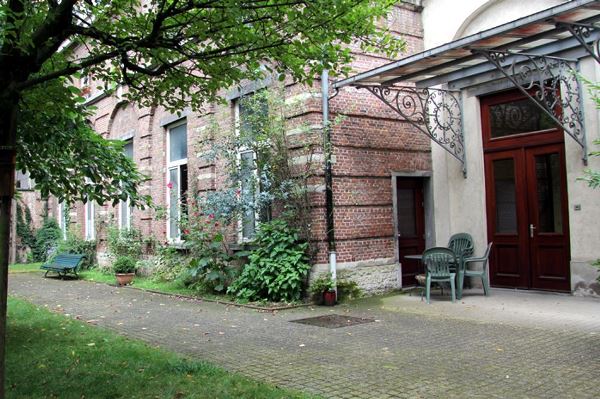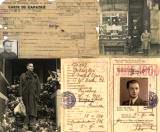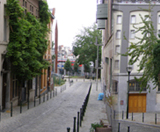New videos (only partially in English)
Summary, abstracts and full texts of issue no. 116
Philippe Mesnard (Editor in chief): Editorial: La gloire et la culture, à propos de l’élection de “Miss Holocaust” [Glory and culture, about the election of “Miss Holocaust”] (pdf in French) (pdf in Dutch)
Dossier: Voyages mémoriels [Memorial visits]
Edited by Frédéric Crahay
Frédéric Crahay (Histoiren, Remembrance of Auschwitz): Présentation (pdf)
Laurence van Ypersele (Catholic University of Louvain-la-Neuve): Tourisme de mémoire, usages et mésusages : le cas de la Première Guerre mondiale [Memory Tourism, use and misuse: the case of the First World War]
- Ruins and battlefields of the First World War will immediately become allegories of the whole of the combatants and of the pain of the nation. Disseminated by propaganda, images of disaster accuse the enemy and become the visible symbol of national sacrifice. But it is only after the war that tourism really unfolds and only according to various logical and ambiguous times: families and veterans come on pilgrimage to the places where friends and family perished, the curious ones come to confront their imagination to reality, while the victims hope to rebuild they lives thanks to the contribution of the pilgrims and the curious.
Sarah Hodgkinson (University of Leicester, England): The concentration camp as a site of ‘dark tourism’
- This paper explores the increasing market for tourism at sites of former Nazi concentration camps. It reviews the recent literature on dark tourism and applies the concept to visits to concentration camps, focusing on the mixed motivations of visitors to these sites, and the role of the former camps as sites of education, memorialisation and tourism. Particular emphasis is placed on Dachau memorial site and museum, and the author’s recent fieldwork in Germany and Austria.
Pierre-Jérôme Biscarat (Maison d’Izieu): Dix ans de voyages pédagogiques à Auschwitz : bilan critique [Ten years of educational visits to Auschwitz: a critical review]
Jean-François Forges (Historien): Visiter Auschwitz [Visiting Auschwitz]
- The visiting of the camp of Auschwitz is a complement to the history course in our schools and should deal with several realities: a concentration camp and a centre for killing Jews, strongly intertwined with the history space witch exceeds largely the memorial space. The meaning of archaeological remains can be illuminated by the numerous documents from the Directorate of Auschwitz construction. The educational work should find a balance between the historical rigor and the emotion.
Frediano Sessi (University of Mantua), Carlo Saletti: Visiter Auschwitz : une proposition de voyage mémoriel. Histoire du site, histoire du musée et histoire des mémoires comparées [Visiting Auschwitz: a proposal for a memorial trip. Site history, history of the museum and the history of compared memory]
Steffen Hänschen (Bildungswerk Stanislaw Hantz e.V.): Studiereizen van het Bildungswerk Stanislaw Hantz naar de kampen van de ‘Aktion Reinhardt’ [Study visits organised by the Bildungswerk Stanislaw Hantz to the deathcamps of the ‘Aktion Reinhardt’]
Geoffrey Grandjean (University of Liège): Les jeunes et les voyages mémoriels à Auschwitz-Birkenau. Quelle place pour une perspective politologique? [Youth and memorial visits to Auschwitz-Birkenau. Is there a place for a political science perspective?]
- Many young Belgians visit the concentration and extermination camps of Auschwitz-Birkenau. What are their opinions? What can we learn from the political science point of view? Exploring the discourses of young’s, this paper presents the three resources that can be mobilized in the learning of the Shoah.
Selective bibliography and sitography
Portfolio
Philippe Mesnard (Editor in chief): Vichy / Mont-Mouchet (pdf in French and Dutch)
Other
Gabriel Raichman (IAD, Louvain-la-Neuve): Au-delà d’une morale de la représentation, un nouveau rapport à la mémoire [Beyond a legal representation, a new report to the memory]
Mylène Herry (Framespa UMR 5136 (CNRS), Toulouse Le Mirail II): Dire et écrire le massacre dans Ayataki de Sócrates Zuzunaga Huaita [Telling and writing about the massacre in Ayataki by Sócrates Zuzunaga Huaita]
Bookhandel (pdf of Book reviews)
- Leïb Rocheman, À pas aveugles de par le monde, transl. from Yiddish by Rachel Ertel, Paris, Denoël, 2012, 831 p.
Review in French by Judith Lindenberg, EHESS - José Gotovitch, Du Communisme et des communistes en Belgique: Approches critiques, Brussels, Aden, 2012, 433 p.
Review in French by Michel Enaudeau, journalist - Laurent Veray, Les Images d’archives face à l’histoire: De la conservation à la création, Chasseneuil-du-Poitou, CNDP (Coll. Patrimoine références), 2011, 319 p.
Review in French by Chrystel Jeandot, University Paris 3 Sorbonne-Nouvelle - Timothy Snyder, Terres de sang: L’Europe entre Hitler et Staline, transl. from English by Pierre-Emmanuel Dauzat, Paris, Gallimard, 2012, 705 p.
Review in French by Anne Roche, University Aix-Marseille - Boris Cyrulnik, Sauve-toi, la vie t’appelle, Paris, Odile Jacob, 2012, 291 p.
Review in French by Corinne Benestroff, University Paris 8 - Sarah Gensburger (ed.), C’étaient des enfants: Déportation et sauvetage des enfants juifs à Paris, Paris, Skira / Flammarion (Coll. Les expositions de l’Hôtel de Ville de Paris), 2012, 125 p.
Georges Garel, in collab.with Katy Hazan, Le sauvetage des enfants juifs par l’OSE, Paris, Le Manuscrit / Fondation pour la Mémoire de la Shoah (Coll. Témoignages de la Shoah), 2012, 347 p.
Review in French by Dina Catenaro-Catenaro, University of Bologna - Alan Riding, Intellectuels et artistes sous l’occupation: Et la fête continue, Paris, Flammarion (Coll. Champs Histoire), 2013, 440 p.
Review in French by Anne Roche, University Aix-Marseille - Patrick Cabanel, Histoire des Justes en France, Paris, Armand Colin, 2012, 414 p.
Review in French by Léon Strauss, University of Strasbourg
Some of our projects
Contact
Auschwitz Foundation – Remembrance of Auschwitz
Rue aux Laines 17 box 50 – B-1000 Brussels +32 (0)2 512 79 98
+32 (0)2 512 79 98 info@auschwitz.be
info@auschwitz.be
BCE/KBO Auschwitz Foundation: 0876787354
BCE/KBO Remembrance of Auschwitz: 0420667323
Office open from Monday to Friday 9:30am to 4:30pm.
Visit only by appointment.
![]()
![]()
![]()
![]()
![]()
Become a member
To become a member of Remembrance of Auschwitz ASBL, please contact us and transfer the sum of €50.00 to our account IBAN: BE55 3100 7805 1744 – BIC: BBRUBEBB with the communication: ‘Membership fee 2025’. The membership includes two issues of 2025 of our scientific journal.
DONATIONS
Donations of €40.00 or more (in one or more instalments) qualify for tax exemption for Belgian taxpayers.
In communication, please specify that it is a ‘Donation’ and mention your National Number which is required since 2024 to benefit from the tax exemption.
Subscribe
Error : Please select some lists in your AcyMailing module configuration for the field "Automatically subscribe to" and make sure the selected lists are enabled










 The Auschwitz Foundation was founded in 1980 by Paul Halter, an Auschwitz survivor. Replacing the Amicale Belge des Ex-Prisonniers politiques d’Auschwitz-Birkenau Camps et Prisons de Silésie, the primary objective of the Auschwitz Foundation is to study the history and memory of the victims of the Holocaust and the Nazi terror in a sustainable and systematic way. The transmission of memory and the preservation of archives concerning these events complete this goal.
The Auschwitz Foundation was founded in 1980 by Paul Halter, an Auschwitz survivor. Replacing the Amicale Belge des Ex-Prisonniers politiques d’Auschwitz-Birkenau Camps et Prisons de Silésie, the primary objective of the Auschwitz Foundation is to study the history and memory of the victims of the Holocaust and the Nazi terror in a sustainable and systematic way. The transmission of memory and the preservation of archives concerning these events complete this goal.





